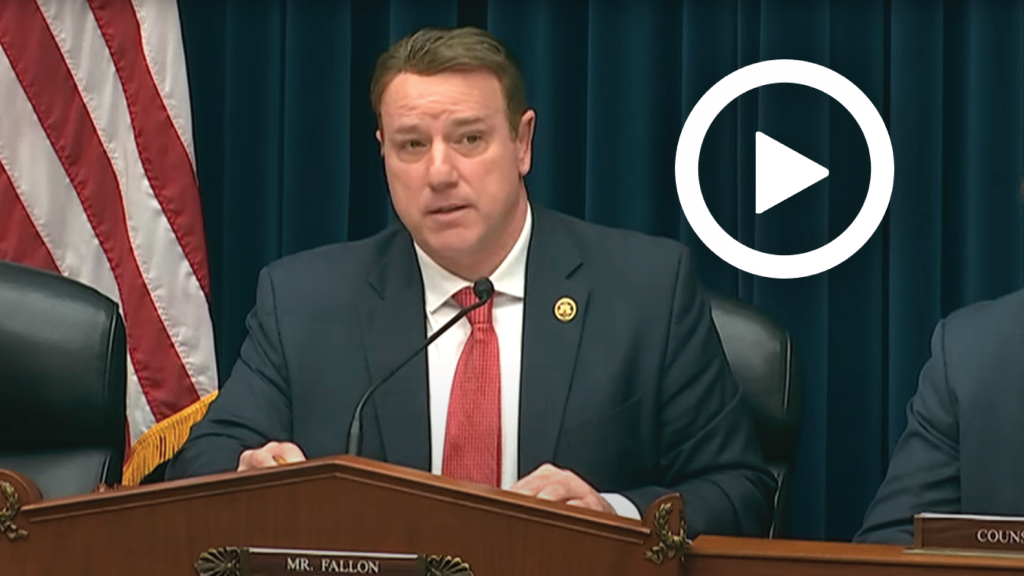Fallon: Biden Administration is Undermining America’s National Security and Energy Independence with LNG Export Pause
WASHINGTON—Subcommittee on Economic Growth, Energy Policy, and Regulatory Affairs Chairman Pat Fallon (R-Texas.) today delivered opening remarks at a hearing titled “Oversight of the Biden Administration’s Pause on Liquified Natural Gas Exports.” Subcommittee Chairman Fallon outlined how the Biden Administration’s liquified natural gas (LNG) pause may have been influenced by leftist environmental groups and climate activists and emphasized how more information is needed to determine whether the Department of Energy may have weaponized the public’s interest in their decision.
Subcommittee Chairman Fallon’s remarks as prepared for delivery appear below.
We are here today to examine the Biden Administration’s announcement of a pause on liquified natural gas (LNG) exports to non-Free Trade Agreement countries, which appears to be nothing more than electioneering and a bending of the knee to leftist environmental activists.
In doing so, however, the Administration is undermining our country’s national security and energy independence.
This Administration, along with leftist activist organizations, have made it abundantly clear that they wish to end all fossil fuel use and reach net-zero emissions by 2050 at any cost.
This effort would be laughable except that it is eviscerating our economy and hurting hardworking Americans across the country.
In fact, the Left’s policies have consistently ignored the energy benefits, jobs, revenues, investments, and educational opportunities that come with LNG facilities across America.
In 2019, America officially became a net-exporter of energy and now leads the world in LNG exports.
We should take great pride in that fact.
However, the Biden Administration’s pause has caused a great deal of alarm and uncertainty.
U.S. LNG producers and exporters are rightfully alarmed by the pause.
In fact, sixteen State Attorneys General have now sued the Department of Energy, arguing that DOE did not have clear congressional authorization to issue the pause and violated the major questions doctrine when it did.
State-level representatives in Texas have gone as far as to create a House Select Committee on Protecting Texas LNG Exports to mitigate the negative consequences of the pause on the LNG industry, the state’s energy sector and Texas’ economy, and I commend them for these efforts.
One key issue with the LNG pause is understanding the federal government’s legal authority to make this decision.
It’s unclear whether the pause is even necessary to update the public interest analysis the Department seeks to update.
When acting on a LNG export permit application to a non-Free Trade Agreement country, the Department conducts a public interest analysis that takes a number of criteria into account.
Many, including several of us in Congress, question whether the Department and the Biden Administration should have applied those same criteria to their decision to pause LNG exports.
Had they applied those criteria, it seems the Administration would have easily decided against pausing LNG exports.
What was the domestic need for the pause? What would be the effect on job creation? What were the international considerations, and what would be the pause’s effect on the environment, which it is purportedly intended to benefit?
If the Biden Administration was truly considering the environmental impacts of LNG exports, it would not have dismissed the role LNG plays in the world’s energy mix.
LNG produces 40 percent less carbon dioxide than coal and 30 percent less than oil, which solidifies LNG as the cleanest fossil fuel in the mix.
The Biden Administration and the Department have defended the pause by arguing that our operational capacity for LNG exports remains at high-levels.
But for how long?
Americans don’t need to read between the lines to understand that this pause is a political decision in an election year.
Our witness, Brad Crabtree from the Department of Energy, leads the Department’s Office of Fossil Energy and Carbon Management.
His office has been tasked to assist in the review and update to the public interest analysis for LNG exports.
Thank you, Mr. Crabtree, for appearing here today and for your willingness to testify on this important issue.
And with that, I yield to Ranking Member Bush for her opening statement.
